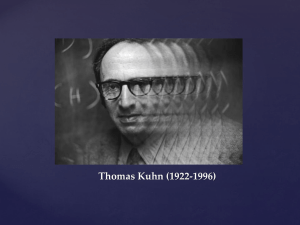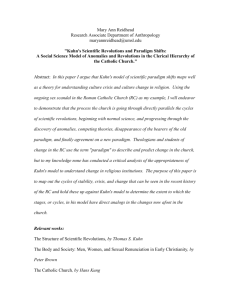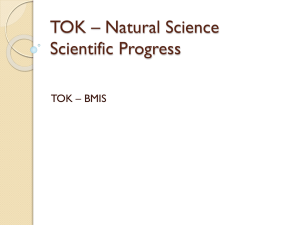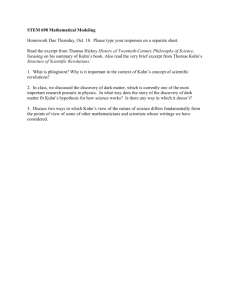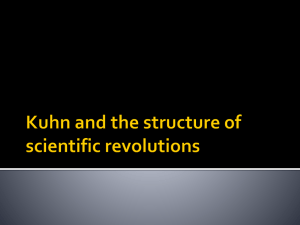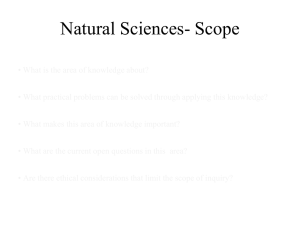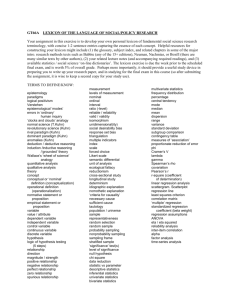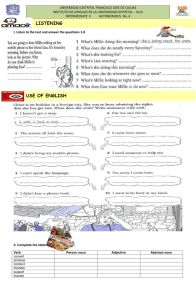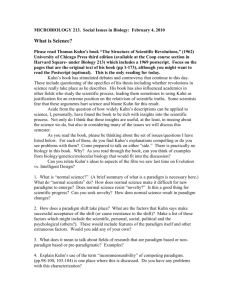Thomas Kuhn
advertisement
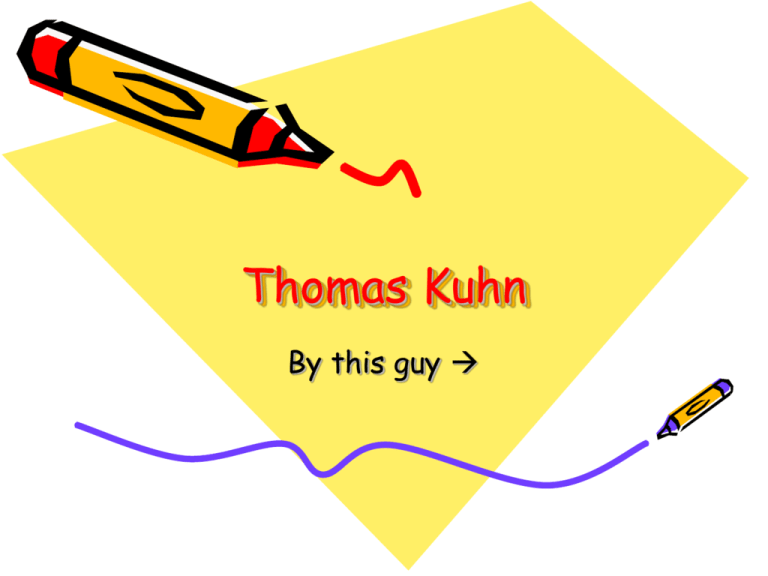
Thomas Kuhn By this guy Content: • • • • • biography info thoughts on knowledge or theories quotes metaphor to describe world Words you need to know • Paradigm: – what is to be observed and scrutinized – the kind of questions that are supposed to be asked and probed for answers in relation to this subject – how these questions are to be structured – how the results of scientific investigations should be interpreted • Normal Science: “problem solving” Biography: • • • Born July 18, 1922, Cincinnati, Ohio, U.S.—died June 17, 1996, Cambridge, Mass. American historian of science noted for The Structure of Scientific Revolutions (1962), one of the most influential works of history and philosophy written in the 20th century. Kuhn earned bachelor's (1943) and master's (1946) degrees in physics at Harvard University but obtained his Ph.D. (1949) there in the history of science. He taught the history or philosophy of science at Harvard (1951– 56), the University of California at Berkeley (1956–64), Princeton University (1964–79), and the Massachusetts Institute of Technology (1979–91). Famous Books: • • • The Copernican Revolution (1957): Kuhn talks about heliocentric universe The Structure of Scientific Revolutions (1962): argues that scientific research and thought are defined by “paradigms,” or conceptual worldviews, that consist of formal theories, classic experiments, and trusted methods. Kuhn's book revolutionized the history and philosophy of science, and his concept of paradigm shifts was extended to such disciplines as political science, economics, sociology, and even to business management. Kuhn's later works were a collection of essays, The Essential Tension (1977), and the technical study Black-Body Theory and the Quantum Discontinuity (1978). Kuhn and Knowledge • • • Kuhn questioned the traditional conception of scientific progress as a gradual, cumulative acquisition of knowledge based on rationally chosen experimental frameworks. Instead, he argued that the paradigm determines the kinds of experiments scientists perform, the types of questions they ask, and the problems they consider important. A shift in the paradigm alters the fundamental concepts underlying research and inspires new standards of evidence, new research techniques, and new pathways of theory and experiment that are radically incommensurate with the old ones. Quotes: • Normal science does not aim at novelties of fact or theory and, when successful, finds none • Under normal conditions the research scientist is not an innovator but a solver of puzzles, and the puzzles upon which he concentrates are just those which he believes can be both stated and solved within the existing scientific tradition. Metaphor • “Literally as well as metaphorically, the man accustomed to inverting lenses has undergone a revolutionary transformation of vision.” Bibliography: • "Thomas Kuhn Biography." Biography.com. Web. 27 Feb. 2011. <http://www.biography.com/articles/Thomas-Kuhn37886>. • "Thomas Kuhn." Division of Educational Studies, Emory. Web. 27 Feb. 2011. <http://www.des.emory.edu/mfp/Kuhnsnap.html>. • "Thomas Kuhn Quotes - BrainyQuote." Famous Quotes at BrainyQuote. Web. 27 Feb. 2011. <http://www.brainyquote.com/quotes/authors/t/thomas_ku hn.html>. • "Thomas Kuhn Quotes." Find the Famous Quotes You Need, ThinkExist.com Quotations. Web. 27 Feb. 2011. <http://thinkexist.com/quotes/thomas_kuhn/>.
